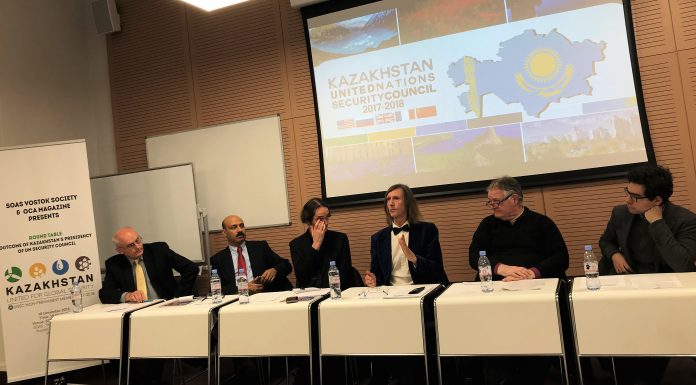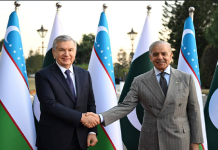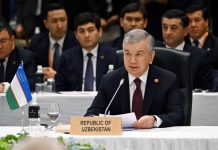(By Special Correspondent – London) : –
A round table seminar was hosted by the SOAS, Vostok Society and Open Central Asia magazine at the University of London, (SOAS) School of Oriental and African Studies in London’s Senate House.
In his opening remarks Dr Shahid Qureshi, Chief Editor of The London Post and Central Asian Affairs said: “It was a great achievement of Kazakhstan to become a non-permanent member of the UNSC as it has two neighbouring countries Russia and China who are permanent members of the UNSC with Veto powers’. Dr Qureshi also said that: “It is time to make some reforms in the UN structure and make it more democratic by giving equal status to all members without exclusive veto powers to some countries. Continuing the discussion, underlining failures in Syria and Iraq and a glut of global Human Rights violations, Dr Qureshi stressed the importance of non-permanent members of the UNSC in bringing different perspectives to the table.” Dr Qureshi said: “Kazakhstan has completed a long journey in a short time at the UNSC”.
The Reverend Parry spoke about the blight of corruption within the Central Asian nation and ongoing reforms to its laws which are tackling this scourge, before turning to the ‘progress Kazakhstan is making, whilst continuing to respect as well as preserve its ancient heritage.’ Rea stressed the technological aspect of these advances before emphasising the importance of Kazakhstan’s neutrality as a peacemaker, a topic Yermalovich expanded upon with reference to Syria, referring to Kazakhstan as a positive role model for all post-Soviet nations.
Kazakhstan being the first Central Asian nation to be elected to the UNSC feels it was a significant achievement for the region as a whole. Kazakhstan’s two-year tenure began on the 1st of January 2017. Giving his inaugural address to the body, President Nursultan Nazarbayev outlined Kazakhstan’s objectives as:
progress towards a nuclear-free world, eliminating the threat of global war, promoting Central Asian interests, the fight against terrorism, peace in Africa, sustainable development and modernising the UNSC and the UN. For the month of January 2018, Kazakhstan assumed chairmanship of the body. With regards to this period, Stephen M. Bland emphasised combating terrorism – with a focus on Afghanistan – and the non-proliferation of weapons of mass destruction as being the central tenets of its leadership.
‘Having seen approximately 500 of its citizens join ISIL and suffered 12 terrorist attacks between 2012-16,’ he told the audience, ‘Kazakhstan was able to steer the body to undertake its first high-level visit to Afghanistan since 2010, highlighting the links between security and development. With regards to non-proliferation Kazakhstan was uniquely placed to tackle the issue of non-proliferation. Having inherited the fourth largest nuclear arsenal in the world, Kazakhstan gave up its nuclear arsenal for a seat at the international table and financial incentives, thus enabling it to present a positive model for approaches to North Korea which accentuate the carrot over the stick.’ On this theme, Irandoost stressed the importance of economic aid when ‘used circumspectly to form relevant and context-based policies towards the eventual objective of a nuclear-free world.’
Following questions from the audience, the event was brought to a conclusion by Bota Hopkinson, Chair of the Conservative Friends of Eurasia, who called for further collaboration on a global scale on the subjects raised by Kazakhstan’s time as a member of the UNSC.
The event was discussing the outcome of Kazakhstan’s membership of the UN Security Council [UNSC]. The panel was comprised of Dr Shahid Qureshi, editor-in-chief of the London Post and expert on Central Asian affairs, Rev. David Parry, playwright and expert on Central Asian literature, Daniele Irandoost, author and commissioning editor at E-International Relations, Andrew Rea, architect and expert on Anglo-Saxon poetry, Stephen M. Bland, award-winning author and journalist specialising in post-Soviet nations, Marat Akhmedjanov, publisher at Hertfordshire Press and Open Central Asia Magazine, and Oleg Yermalovich, a senior Belarus diplomat in the U.K.






